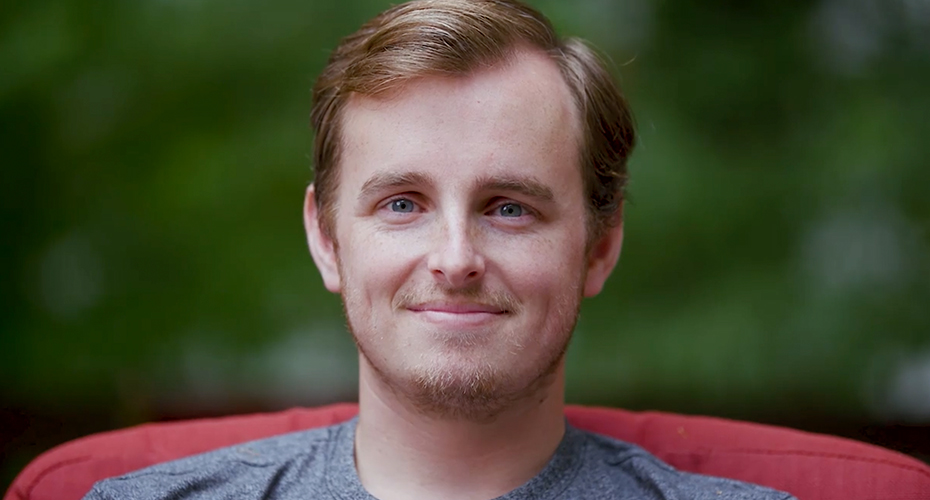Aug 10, 2023
When to seek help for anxiety
One night earlier this year, Kevin Patton, 26, felt a normal night suddenly go haywire.
“I just felt a wave crash over me, I was hyperventilating, my heart was racing, and I couldn’t get any of it to stop,” Patton said. “I ran to the bathroom and hunched over my sink. I was just trying to figure out how to make it stop.”
Eventually the feelings subsided, and Patton would eventually realize that he suffered from what doctors would characterize as a “mild” anxiety attack – though he felt it was anything but mild.
Watch Kevin's story here
What is anxiety?
Anxiety is one of the most common human emotions – and can be one of the most useful. Healthy anxiety can motivate us to prepare for challenging sports or workplace events, or spur us to pay attention while driving, for example.
But anxiety also can develop into persistent, extreme fear or worry in everyday situations. Some anxiety disorders appear to be genetic, running in families. Trauma or stressful events, like a death of a relative, also can spur anxiety disorders.
Almost 1 in 5 adults in the U.S. have an anxiety disorder, according to the National Institute of Mental Health.
When should we seek help?
“When anxiety becomes overwhelming and prevents us from enjoying ordinary activities, it’s time to get help,” said Dr. Greg Harris, a practicing psychiatrist and senior medical director, behavioral health, at Blue Cross Blue Shield of Massachusetts.
The National Alliance on Mental Illness identifies four main types of disorders:
- Generalized anxiety disorder causes time-consume worrying about everyday life, making it difficult to focus, and is often accompanied by exhaustion and headaches.
- Social anxiety disorder causes intense fear about social interaction, often resulting in isolation and withdrawal and sometimes panic attacks.
- Panic disorder causes sudden feelings of terror with powerful physical symptoms such as chest pain, heart palpitations, dizziness, shortness of breath and stomach upset.
- Phobias create strong irrational fears of certain places, events or objects, hampering a person’s everyday activities.
What treatment is available?
Every patient is different, Harris notes. Depending on your symptoms, a clinician may recommend:
Psychotherapy, such as cognitive behavioral therapy
Medications, such as antianxiety medications or antidepressants
Mindfulness approaches, including stress and relaxation techniques
Getting help
After Patton’s anxiety attack, he immediately scheduled an appointment to see his doctor.
“I was put on medication, and we were doing checkups every month to see how I was doing,” he said.
The first medication Patton tried left him feeling lethargic, struggling to find the energy to get up in the morning. He shared his feedback with his doctor who prescribed a new medicine, and Patton has been taking it ever since.
Anti-anxiety medications help regulate the brain chemicals that affect emotions and thought patterns. Clinicians may recommend therapy in addition to medication.
“I was given a list of therapists I could get with my insurance that were affiliated with the hospital that my doctor is affiliated with,” Patton said. “It was really easy and manageable.”
For Patton, the results have been life-changing. Recently, he said, he experienced what he called an “ah-ha!” moment.
“My mom and I were just standing in the kitchen and I just realized over the past week that I had been getting less and less frustrated and upset and mad at the little things,” he recalled. “Nothing was getting me upset anymore. I just looked at my mom and said, 'I said I think it’s working.’”
Today, Patton said, he is living a happier life because he made the difficult decision to ask for help when he realized he needed it. He urges others who are struggling to reach out too.
You can’t just sit by when you know that there is even a chance that you could be happier or living a better life
said Kevin
“If you ask somebody — a doctor, your friends, your family or a neighbor —and they are willing to help you, then you can have a happier life for yourself.”
Are you a Blue Cross Blue Shield of Massachusetts member who is looking for a therapist? Call 1-888-389-7764 or use our Find a Doctor & Estimate Costs tool to find licensed therapists. Check out more resources here.

